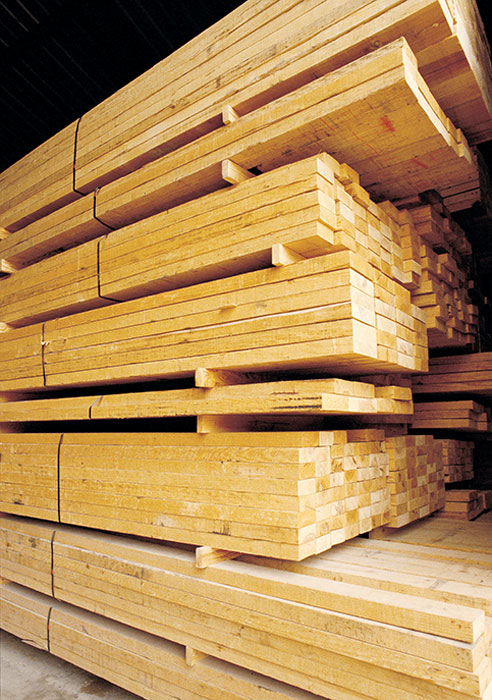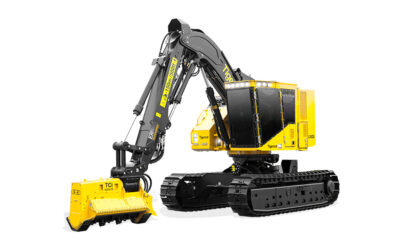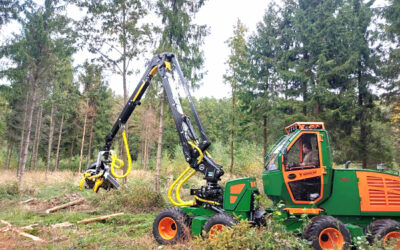Southern Softwood Lumber Explosion
Article by DK Knight, Executive Editor/Co-Publisher, Timber Harvesting June 2018
 Output of Southern softwood lumber has increased for several years now and it appears production will advance to record levels this year and next, and probably beyond, provided there are no serious economic, political or terrorist-related setbacks.
Output of Southern softwood lumber has increased for several years now and it appears production will advance to record levels this year and next, and probably beyond, provided there are no serious economic, political or terrorist-related setbacks.
Last year the region’s pine sawmills processed roughly 100 million tons of logs in manufacturing 18.2 billion BF, a gain of 5.1% over 2016. That was 54% of national output and 29% of North American production. Western U.S. output was 14.1 billion BF, up 3%. Canada’s total, 28.3 billion BF, was virtually unchanged from 2016.
Capital investment is pouring into numerous projects—new mills, expansions, process refinements, additional shifts, etc. This unprecedented expansion should help propel production to a record level this year, breaking the modern output of 19 billion BF set in 2005. According to the Southern Forest Products Assn., founded in 1915, it is unclear if a higher volume was produced in any previous year in the 20th century.
Production should easily exceed 20 billion BF in 2019, assuming the economy takes no serious hits, housing starts remain solid, remodeling spending continues, and exports remain strong. For the 2017-2019 period, projects that have been completed, along with those ongoing and those recently revealed, represent some 3 billion BF of additional annual lumber capacity. What’s more, additional expansions and a few more greenfield mills are a good bet as manufacturers anticipate a developing lumber mega-market.
Here is a general summary:
—Interfor is spending $46 million for a major upgrade at its Monticello, Ark. facility and lesser amounts to tweak its other multiple works in Georgia. It has also identified a site in the central region for a new 200MMBF operation.
—Canfor has announced a new 275MMBF plant for Washington, Ga. and committed $125 million for modernization and refinements at several mills that will increase annual capacity by another 75MMBF.
—At Talladega, Ala., Georgia-Pacific is nearing completion of a new 230 MMBF capacity mill and has upgraded an existing plant at Belk, Ala. Earlier this year G-P told it would build a new 350MMBF mill to replace its existing facility, now producing about 110MMBF per year, at Warrenton, Ga. G-P has indicated other projects will be forthcoming, and some speculate the next one will involve the restart of its idle mill at Buna, Tex.
—Rex Lumber Co. is building a new mill near Troy, Ala. that will have a capacity of 240MMBF.
—Two Rivers Lumber Co. last year completed a new 200MMBF plant near Demopolis, Ala.
—Although it has yet to officially reveal the location of the facility, Westervelt Lumber recently announced it intends to erect a new 250MMBF capacity plant in Alabama. Speculators point to a site near Thomasville.
—Elsewhere in Alabama, Weyerhaeuser is converting its stud mill at Millport to a more conventional sawmill, greatly increasing log intake and lumber output. Also, the company is expected to finally officially start up its gigantic new mill at Dierks, Ark.
—LaSalle Lumber Co., a joint venture involving Louisiana’s Hunt Lumber Co. and Canada’s Tolko Industries, has a new 200MMBF capacity mill going up near Urania, La. At least two more companies are each said to be considering a new mill in the state.
—Biewer Lumber in early 2017 opened its new 230MMBF facility in Newton, Miss. and reportedly has indicated it may erect another in either Mississippi or Arkansas.
—Two idle mills in Arkansas were upgraded and restarted last year: Conifex with the mill once owned by Georgia-Pacific at El Dorado (180 MMBF capacity); and Caddo River Forest Products with the former Curt Bean Lumber Co. at Glenwood (100MMBF).
—Jordan Lumber Co. added a third green line to its already big mill at Mt. Gilead, NC, making it the largest capacity single shift mill in the region.
—Sooner or later, Klausner, or another company, will start up that long since finished but still idle mill at Enfield, NC.
—West Fraser typically does not announce its construction plans, but 18 months ago did reveal it would expand production at its Newberry, SC mill by 37%. Last year it spent millions to significantly increase output at mills in Opelika and Maplesville, Ala. The company may be considering building its first ever greenfield sawmill in the region, possibly in central Alabama.
All this new and expanded production will mean a heightened annual log demand that could push 13 million tons. The timber is certainly available, as is logging capacity. What about mill labor? That could be an issue. What about trucking capacity? That could be a serious issue.
New and expanded mills will produce abundant quantities of chips and other residues, all of which will require more trucks, trailers, and drivers. However, this increased chip production will trim roundwood demand at some paper, OSB and pellet plants in certain locations, so the net trucking demand will be offset to a certain extent.
Latest News
New From Tigercat: Convertible Mulcher/Feller-Buncher; Mulching Head
New From Tigercat: Convertible Mulcher/Feller-Buncher; Mulching HeadIn response to growing requirements for fire mitigation interventions and increased management of forestland in the western U.S.,...
Updated From Kesla Oyj: 6H Series Small Harvester Cranes
Updated From Kesla Oyj: 6H Series Small Harvester CranesKesla Oyj is expanding its small harvester crane product line by introducing new, more versatile versions. The updated 6H series meets the...
January/February 2026
January / February 2026Levanen, Inc. Invests In New Equipment, Tech Washington’s Levanen, Inc. invests in new technology as brothers take over and upgrade family business. INSIDE THIS ISSUELevanen,...
WANT MORE CONTENT?
Spanning seven decades since its inception in 1952, Timber Harvesting highlights innovative and successful logging operations across the U.S. and around the world. Timber Harvesting also emphasizes new technology and provides the best marketing vehicle for the industry’s suppliers to reach the largest number of loggers in North America and beyond.
Call Us: 800.669.5613



